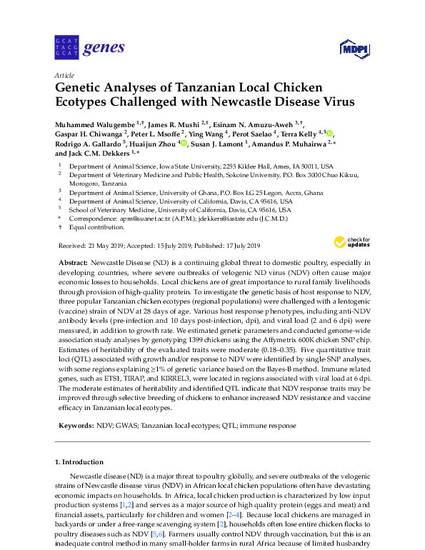
Newcastle Disease (ND) is a continuing global threat to domestic poultry, especially in developing countries, where severe outbreaks of velogenic ND virus (NDV) often cause major economic losses to households. Local chickens are of great importance to rural family livelihoods through provision of high-quality protein. To investigate the genetic basis of host response to NDV, three popular Tanzanian chicken ecotypes (regional populations) were challenged with a lentogenic (vaccine) strain of NDV at 28 days of age. Various host response phenotypes, including anti-NDV antibody levels (pre-infection and 10 days post-infection, dpi), and viral load (2 and 6 dpi) were measured, in addition to growth rate. We estimated genetic parameters and conducted genome-wide association study analyses by genotyping 1399 chickens using the Affymetrix 600K chicken SNP chip. Estimates of heritability of the evaluated traits were moderate (0.18–0.35). Five quantitative trait loci (QTL) associated with growth and/or response to NDV were identified by single-SNP analyses, with some regions explaining ≥1% of genetic variance based on the Bayes-B method. Immune related genes, such as ETS1, TIRAP, and KIRREL3, were located in regions associated with viral load at 6 dpi. The moderate estimates of heritability and identified QTL indicate that NDV response traits may be improved through selective breeding of chickens to enhance increased NDV resistance and vaccine efficacy in Tanzanian local ecotypes.
Available at: http://works.bepress.com/susan_lamont/128/

This article is published as Walugembe, Muhammed, James R. Mushi, Esinam N. Amuzu-Aweh, Gaspar H. Chiwanga, Peter L. Msoffe, Ying Wang, Perot Saelao et al. "Genetic Analyses of Tanzanian Local Chicken Ecotypes Challenged with Newcastle Disease Virus." Genes 10, no. 7 (2019): 546. doi: 10.3390/genes10070546.